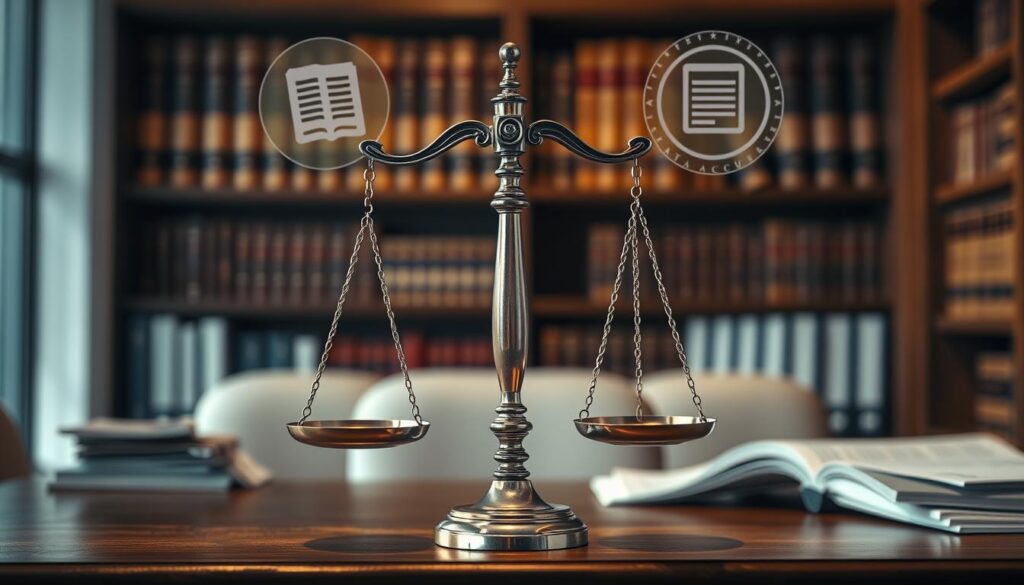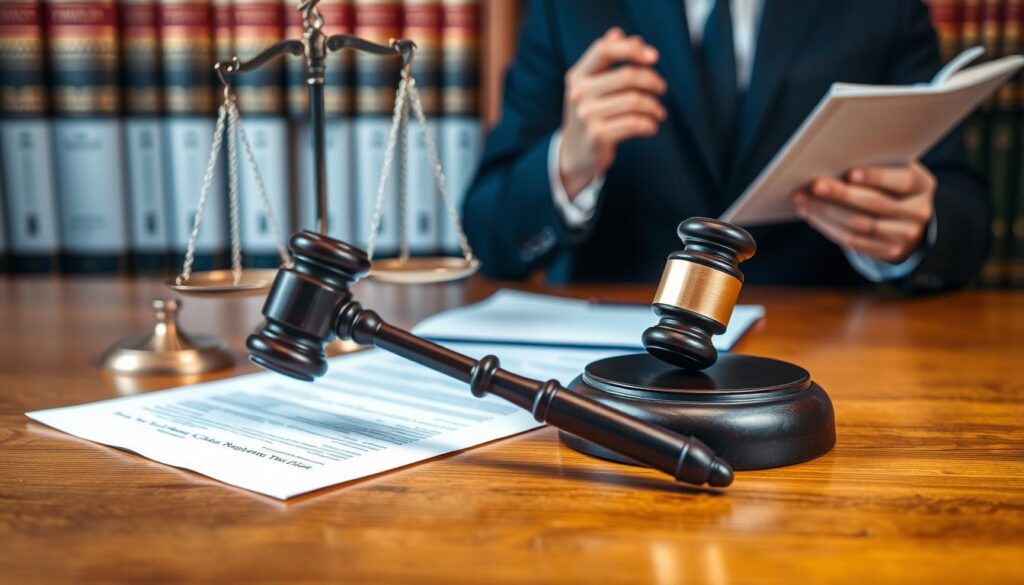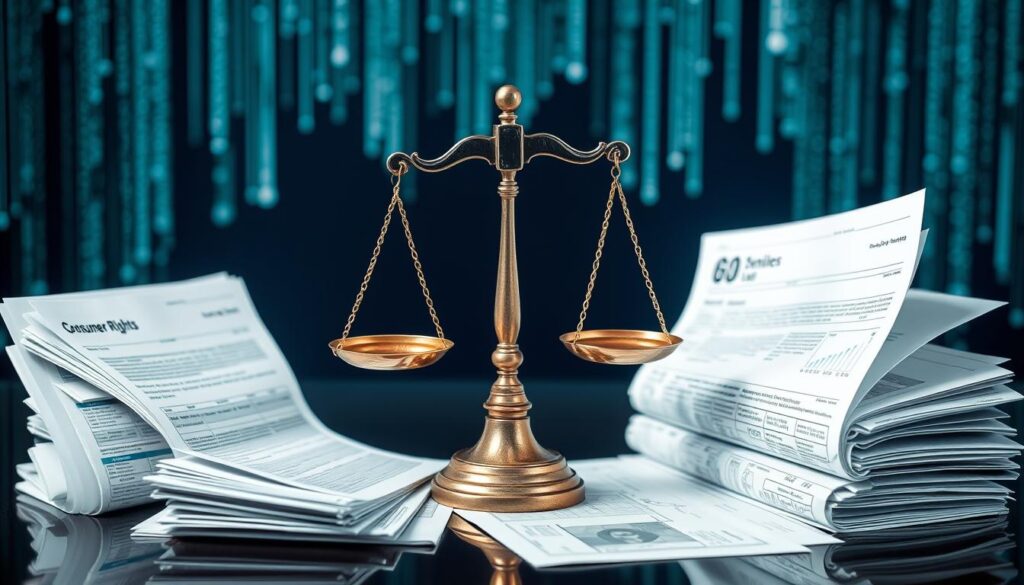Accurate credit information is vital for your financial health. It affects your ability to get loans, mortgages, and credit cards. Sadly, credit report errors are common and can cause serious problems. Let’s explore how a credit report inaccuracies lawyer can help you.
These legal experts protect your rights and work to fix your credit. They understand the complex laws that govern credit reporting. With their help, you can challenge errors and restore your financial standing.
Key Takeaways
- Accurate credit reports are essential for financial well-being
- Credit report inaccuracies can have significant consequences
- Credit report inaccuracies lawyers can help protect your rights and correct errors
- Understanding the Fair Credit Reporting Act is crucial for addressing credit report issues
- Seeking legal assistance can be beneficial when dealing with credit report disputes
The Importance of Accurate Credit Reports
Credit reports shape your financial future. Lenders, landlords, and employers use them to gauge your creditworthiness. Accurate information is vital for securing fair interest rates and credit limits.
Inaccurate data can lead to loan denials and higher rates. It may even hinder housing and job prospects. Protecting your financial health starts with precise credit information.
Credit Reports: The Foundation of Financial Stability
Credit reports detail your financial history. They show payment patterns, debts, and credit use. Lenders use these to assess lending risks.
Landlords check reports to find reliable tenants. Employers may review them to evaluate financial responsibility. Accurate information opens doors to better opportunities.
Consequences of Inaccurate Credit Information
Errors in credit reports can cause serious problems. These may include identity errors, mixed files, or incorrect payment histories. Such mistakes can lead to loan rejections.
You might face higher interest rates on credit. Finding housing or employment could become challenging. These issues can impact your financial well-being long-term.
| Consequence | Impact |
|---|---|
| Denied Loans | Inability to secure financing for major purchases, such as a home or car |
| Higher Interest Rates | Increased borrowing costs, leading to higher monthly payments and long-term financial strain |
| Difficulty Finding Housing | Landlords may reject rental applications based on inaccurate credit information |
| Employment Challenges | Employers may use credit reports to evaluate job applicants, potentially leading to missed opportunities |
Accurate credit reports are key to financial stability. They help you access the best credit terms and opportunities. Addressing credit report inaccuracies is crucial.
A credit report inaccuracies lawyer can help protect your financial well-being. They can assist with score disputes and ensure your report’s accuracy.
Common Credit Report Inaccuracies
Credit reports often contain mistakes that can harm your financial health. These errors range from identity mix-ups to incorrect payment histories. Such inaccuracies can damage your credit score and financial stability.
Identity Errors and Mixed Files
Identity errors and mixed files are frequent issues in credit reports. This happens when your personal info gets mixed up with someone else’s credit data. Such mix-ups can lead to wrong info on your credit report.
These errors can affect your creditworthiness and limit your financial options. It’s crucial to spot and fix these mistakes quickly.
Incorrect Payment Histories
Wrong payment histories are another common problem in credit reports. This occurs when your past payments aren’t correctly shown on your report. It may include fake late payments or missing on-time payments.
These errors can hurt your credit score badly. They can make it harder to get loans, credit cards, or even jobs.
Fixing these consumer reporting errors and inaccurate credit bureau data is key. It’s vital for correcting credit report mistakes and keeping a good financial record. Knowing these common errors helps you take charge of your credit.
Understanding the Fair Credit Reporting Act
The Fair Credit Reporting Act (FCRA) is a key federal law. It governs consumer credit information collection and use. This law outlines rights and duties for consumers, credit agencies, and data providers.
The FCRA aims to ensure accurate and fair credit reporting. It gives consumers the right to see their credit reports. They can dispute errors and seek remedies for Fair Credit Reporting Act violations.
Credit bureaus and data furnishers must maintain reliable credit reports. The law imposes strict obligations on them. This helps protect consumer privacy and financial well-being.
Under the FCRA, consumers have several important consumer rights in credit reporting. These rights empower individuals to manage their credit information effectively.
- The right to obtain a free copy of their credit report annually from each of the three major credit bureaus
- The right to dispute any inaccurate or incomplete information on their credit report
- The right to be notified when negative information is added to their credit report
- The right to have incorrect information removed or corrected from their credit report
- The right to seek compensation for damages resulting from Fair Credit Reporting Act violations
Knowing FCRA protections helps consumers maintain accurate credit reports. They can hold credit agencies accountable for credit reporting agency lawsuits or rights violations.

“The FCRA is a powerful tool for consumers to safeguard their financial well-being and maintain control over their credit information.”
Credit Report Inaccuracies Lawyer: Your Ally in Credit Disputes
A credit report inaccuracies lawyer can be your best friend when facing credit report errors. These experts know the Fair Credit Reporting Act (FCRA) inside and out. They can help you dispute errors with credit bureaus and seek legal solutions.
A skilled credit repair attorney can help you get compensation for FCRA violations. They can also ensure that wrong information on your credit reports gets fixed.
Expertise in Credit Reporting Laws
Credit report mistakes can mess up your chances of getting loans or jobs. Credit report inaccuracies lawyers know all about credit reporting laws. They can spot and fix many issues, from identity errors to wrong payment histories.
These legal pros make sure your FCRA rights are respected. They also explore legal remedies for credit inaccuracies to help you out.
Navigating the Dispute Process
Fighting credit report errors can be tough and time-consuming. There are tricky steps and tight deadlines to follow. Credit report inaccuracies lawyers can guide you through this process.
They’ll help gather all the needed paperwork. They’ll also make sure your dispute is filed right with the credit bureaus. Their know-how can boost your chances of winning and cleaning up your credit report.
“Having a credit report inaccuracies lawyer on your side can make all the difference in navigating the complex world of credit reporting and securing the legal remedies you deserve.”
Steps to Take When Facing Credit Report Errors
Credit report errors can impact your financial future. But don’t worry! You can fix mistakes in your credit report. Let’s explore how to correct identity errors, mixed files, and wrong payment histories.
Gathering Necessary Documentation
Start by collecting all documents that support your case. This includes credit reports from Experian, Equifax, and TransUnion. Gather proof of identity like a driver’s license or passport.
Also, collect payment records and receipts. These will help prove your credit history is correct. Having this info ready will make the dispute process smoother.
- Copies of your credit reports from each of the three major credit bureaus (Experian, Equifax, and TransUnion)
- Proof of identity, such as a driver’s license or passport
- Payment records, receipts, or other documentation to demonstrate the accuracy of your credit history
With these documents, you’ll be better equipped to correct credit report mistakes. Your chances of success will increase significantly.
Filing a Dispute with Credit Bureaus
Next, dispute the wrong info with credit bureaus. Write a letter explaining the errors and include your evidence. The Fair Credit Reporting Act requires bureaus to investigate your claim quickly.
If bureaus don’t fix errors or you’re unhappy with their response, consider legal action. You might file credit reporting agency lawsuits. Or, seek help from a credit report inaccuracies lawyer.
“Taking proactive steps to address credit report inaccuracies is crucial for protecting your financial well-being and achieving your financial goals.”
Legal Remedies for Credit Report Inaccuracies
Credit report errors can be fixed through legal means. The Fair Credit Reporting Act (FCRA) gives you rights to correct mistakes. You can take action to fix errors and maybe get money for damages.
Correcting Inaccurate Information
Start by working with a lawyer to dispute errors with credit agencies. Provide proof to support your claim and ensure timely investigation.
You have the right to remove or fix wrong info on your credit report. This can greatly improve your financial standing.
Pursuing Financial Compensation
If errors caused financial harm, you might get legal remedies for credit inaccuracies. This includes denied credit or higher interest rates.
A skilled attorney can help you seek financial compensation for damages. They can guide you through consumer rights in credit reporting violations.
Working with a lawyer helps you use your rights effectively. You can take steps to fix credit report errors and restore your financial records.

Choosing the Right Credit Report Inaccuracies Lawyer
Picking the right lawyer for credit report issues is vital. Credit report inaccuracies lawyers know the Fair Credit Reporting Act (FCRA) inside out. They have a history of solving credit disputes for consumers.
Experience and Track Record
Find a credit repair attorney who’s dealt with many credit report disputes. They should know credit reporting laws well. A good lawyer can guide you through the dispute process smoothly.
Client-Focused Approach
Your credit report inaccuracies lawyer should put your needs first. They must be easy to reach and clear in their communication. Look for someone who truly cares about your financial health.
| Factors to Consider | Importance |
|---|---|
| Experience in credit reporting laws | High |
| Track record of successful outcomes | High |
| Client-focused approach | High |
| Clear communication and transparency | High |
| Reasonable fees and cost structure | Moderate |
Think about these factors when choosing your lawyer. A good credit report inaccuracies lawyer will fight for your rights. They’ll help you fix your credit report issues effectively.
The Role of Credit Repair Attorneys
Credit repair attorneys are vital in fixing credit report errors. They help consumers navigate complex credit reporting and disputes. These experts use their knowledge of consumer rights and legal remedies to correct mistakes.
These lawyers know the Fair Credit Reporting Act inside out. They can spot and challenge inaccuracies in your credit report. Their skills in dealing with credit bureaus can help restore your financial credibility.
Credit repair attorneys can also pursue legal action when needed. If bureaus or creditors ignore disputes, they can fight for you. They may seek compensation for damages caused by errors.
“Working with a credit repair attorney has been a game-changer for me. They helped me navigate the complex credit dispute process and ultimately restore my credit score. I highly recommend their services to anyone facing credit report inaccuracies.”
Hiring a credit repair attorney helps you take charge of your finances. They ensure your credit report shows your true creditworthiness. With their help, you can overcome errors and regain financial stability.
Consumer Rights in Credit Reporting
The Fair Credit Reporting Act (FCRA) protects consumers’ credit information. This law ensures accuracy, fairness, and privacy in credit reports. It provides a framework for consumer rights in credit reporting.
Fair Credit Reporting Act Protections
The FCRA gives consumers the right to dispute credit report errors. Credit bureaus must investigate these disputes and fix any mistakes. Consumers can also get notified about new negative information on their reports.
Holding Credit Bureaus Accountable
- If credit bureaus break FCRA rules, consumers can take legal action.
- Violations like failing to investigate disputes can lead to compensation for affected consumers.
- Consumers can seek damages from credit agencies that violate their FCRA rights.
Knowing your consumer rights in credit reporting is key to financial well-being. Understanding Fair Credit Reporting Act violations helps protect these rights. Credit reporting agency lawsuits can hold bureaus accountable for unfair practices.

Credit Reporting Agency Lawsuits
Consumers can take legal action against credit reporting agencies for persistent inaccuracies or FCRA violations. These credit reporting agency lawsuits can correct errors and secure compensation. A credit report inaccuracies lawyer offers crucial guidance in this complex process.
The FCRA gives consumers legal remedies for credit inaccuracies. It allows them to dispute and fix wrong information on credit reports. Lawsuits may be filed if bureaus fail to investigate or resolve disputes promptly.
Such lawsuits aim to make credit bureaus fix credit report mistakes. They can also seek damages for harm caused by incorrect information. Successful plaintiffs may receive compensation for expenses, lost opportunities, and emotional distress.
Credit reporting agency lawsuits empower consumers to assert their consumer rights in credit reporting. With an experienced lawyer, individuals can navigate the legal process effectively. This approach helps achieve desired outcomes in credit dispute cases.
“Credit report inaccuracies can have far-reaching consequences, but consumers have the right to fight back and seek justice through the legal system.”
Correcting Credit Report Mistakes: A Step-by-Step Guide
Inaccurate credit bureau data can harm your financial well-being. Fixing these errors is vital for a healthy credit score. Let’s explore how to address these issues and regain control of your credit profile.
Start by reviewing your credit reports from Experian, Equifax, and TransUnion. Look for errors like incorrect payment histories, identity errors, or mixed files. Collect documents to support your case, such as receipts and account statements.
Dispute inaccurate information with the credit bureaus. Submit a formal written dispute online, by mail, or through their dispute portals. Follow up regularly and request updates on your case’s status.
- Dispute the inaccurate information with the credit bureaus. You can do this by submitting a formal written dispute, either online, by mail, or through the bureaus’ dispute portals.
- Follow up on your dispute regularly and request updates on the status of your case. Be persistent in ensuring the credit bureaus investigate your claim and make the necessary corrections.
- If the credit bureaus fail to resolve the issue, you may need to escalate your case by contacting the Consumer Financial Protection Bureau or seeking the assistance of a credit report inaccuracies lawyer.
The process of correcting credit report mistakes takes time but is crucial. Your effort can lead to improving your credit score and securing a better financial future.
| Common Credit Report Inaccuracies | Impact on Credit Score |
|---|---|
| Incorrect Payment Histories | Significant Negative Impact |
| Identity Errors and Mixed Files | Moderate to Significant Negative Impact |
| Outdated or Unverified Information | Moderate Negative Impact |
“Correcting credit report mistakes is a crucial step in maintaining a healthy financial profile and securing favorable lending terms.”
Inaccurate Credit Bureau Data: The Hidden Costs
Inaccurate credit bureau data can harm more than just your credit score. These errors can create significant challenges in various aspects of your life. They may affect your ability to secure loans, credit cards, or even find employment.
Dealing with credit report errors can cause emotional and financial stress. The impact on your well-being shouldn’t be underestimated. It’s crucial to address these issues promptly.
Erroneous information can lower your credit score, making it harder to access favorable interest rates. This can hinder your ability to achieve financial stability and reach long-term goals. Incorrect payment histories or mixed files are common culprits.
Inaccurate data can also pose challenges in the job market. Many employers use credit reports during the hiring process. Negative information, even if incorrect, might jeopardize your employment prospects.
Disputing and correcting inaccurate information can be complex and frustrating. It may lead to anxiety and a sense of powerlessness. This process can significantly impact your mental health and overall quality of life.
Taking action against inaccurate credit bureau data is vital for maintaining financial stability. Understanding these hidden costs can motivate you to seek help. A credit report inaccuracies lawyer can guide you through the dispute process.

“Inaccurate credit bureau data can have a profound impact on a consumer’s financial well-being, making it essential to take proactive steps to address and correct any errors.”
The effects of inaccurate credit bureau data go beyond your credit score. By addressing these issues, you can regain control over your financial future. Take action today to ensure your credit information is accurate and up-to-date.
Legal Strategies for Credit Score Disputes
Credit report errors can lower your credit score. You have legal options to dispute these inaccuracies. A credit report inaccuracies lawyer can help challenge the credit bureau’s methods and provide evidence of mistakes.
The Fair Credit Reporting Act (FCRA) protects consumers in credit reporting. These legal rights can help restore your credit score. This improvement can boost your overall financial health.
Challenging Credit Bureau Methodology
A lawyer can explain how credit bureaus calculate your score. They can spot flaws in this process. Your attorney will build a strong case to correct your score.
Providing Evidence of Errors
Gathering proof of credit report mistakes is crucial. Your lawyer will help collect necessary documents. They’ll effectively communicate these details to credit bureaus.
Pursuing Legal Action
Credit bureaus might not address your credit score disputes properly. Your lawyer may suggest legal action in this case. This could involve filing a lawsuit to protect your consumer rights in credit reporting.
A skilled credit report inaccuracies lawyer guides you through complex disputes. They ensure your credit score reflects your true financial history. This expertise can make a significant difference in resolving credit issues.
The Impact of Credit Report Inaccuracies on Your Life
Wrong credit info can affect more than just your money. It can impact many parts of your life. A credit report inaccuracies lawyer can help protect your financial future.
Consumer reporting errors can make it hard to get loans or credit cards. Lenders use credit reports to check if you’re trustworthy. Bad info can lead to loan denials or high interest rates.
This can make it tough to buy a home or start a business. It can stop you from reaching your money goals.
Inaccurate credit bureau data can also hurt job chances. Employers often check credit history when hiring. Wrong info can cause job rejections or missed promotions.
This can affect your career and money stability. Fixing credit report errors is key to keeping your finances healthy.
A credit report inaccuracies lawyer can help make sure your report is correct. They can update it to show your true credit worth. This helps you make smart money choices and reach your goals.
“Inaccurate credit information can have far-reaching consequences that extend beyond just your financial well-being.”
Conclusion: Prioritizing Accurate Credit Information
Accurate credit information is crucial for financial stability and better financial product terms. Consumers can dispute errors and seek legal help for credit report inaccuracies. A credit report inaccuracies lawyer can help correct consumer reporting errors and address Fair Credit Reporting Act violations.
Accurate credit data is essential for managing your financial well-being. Inaccurate information can affect loan approvals and insurance rates. Legal help can strengthen your financial position and create new growth opportunities.
Credit report accuracy is your right, protected by federal law. Stay alert and correct any credit report inaccuracies promptly. This ensures your financial future is built on reliable information.

